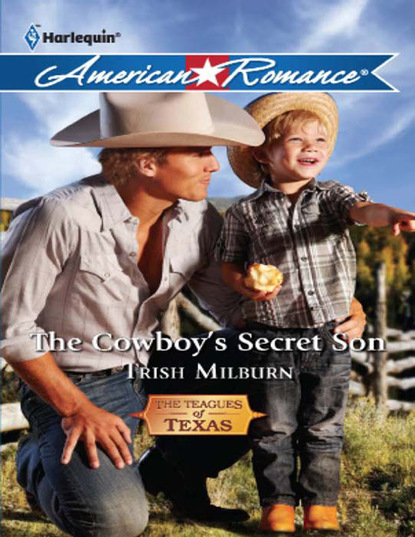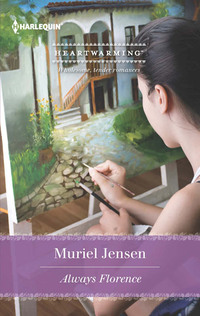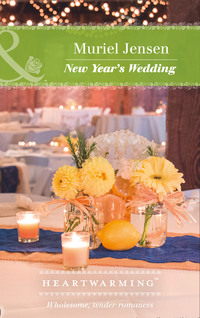
Полная версия
That Summer In Maine
She leaned slightly away from him to look into his eyes. Hers were still filled with tears. His heart bled for her.
“You didn’t tell me my father had had a heart attack,” she said, her tone mildly accusing. “I’m surprised your father didn’t write or call me.”
For a minute he didn’t know what to say. He saw a pitcher of water and a cup on her beside table and reached for it to cover up his confusion. As far as he knew, Elliott hadn’t had a heart attack. He didn’t know everything that went on in the Lawtons’ lives, but his father usually kept him up on the important things. He couldn’t imagine he would have let that slip by.
“Where’d you hear that?” he asked, pouring water into the cup and handing it to her.
“Thank you. From my father! He told me when he was trying to get me to come home.” She looked at him with sudden suspicion as she sipped from the cup. “Or, didn’t it happen? I didn’t want to go home and he might have been…”
“Ah…well, I’m not sure. My father’s always trying to protect me, too. I know he’s been worried about your dad, so it’s entirely possible.” That was partly true. His father was always worried about his friend, who, at sixty-four, took off on nebulous missions for the State Department as though he was still a man in his prime. He just wasn’t sure he was worried about Elliott’s heart.
Duffy was suddenly distracted from that puzzle when he became aware of a subtle tension in the air. The intimacy of their embrace in the middle of the bed, hardly necessary now that she was composed again seemed to be generating it.
He knew she was aware of it, too, when her eyes met his in confused surprise. Using her hands on the mattress for leverage, she pushed herself slightly away from him. He noticed for the first time the tailored white silk nightshirt she wore—and the length of slender leg it revealed.
“I…I’m going to try to get time off,” she said a little distractedly, “sometime in July.”
He stood, going to the window and pushing her draperies back. The sun was low, long shadows falling across the park. The beautiful setting made him inexplicably homesick.
“Why don’t you just come home with me?” he suggested.
She blinked, surprised by the suggestion. “I can’t do that,” she said.
“Why not?”
“Because I’m the lead in a play,” she replied, her eyes a little desperate. “Because all my credit cards are in a gully somewhere in the Pyrenees. Because…”
“I can’t imagine your boss refusing you a couple of weeks R and R after what you’ve been through. And I’ll spring for your airfare and lend you some money until you get the credit cards straightened out.”
“I can’t leave the country without my passport.” She looked satisfied with that excuse. Even proud of it. “I’ve misplaced it in the shuffle of bags and reporters and hurry.”
He spotted her things apparently thrown carelessly on a chair when she’d changed for bed last night and saw her passport pinned to her bra strap. He hooked the lacy lavender thing in one finger and held it up, the book dangling.
“I’ll make reservations for two, then,” he said. “Give your father some peace of mind and you a probably much-needed rest.”
That surprised look she’d given him a moment ago registered a little longer, then turned to annoyance. She pushed herself to her feet with a sudden, imperious expression, intended, he was sure, to put him in his place.
“Look, Duffy,” she said, tossing her hair. He guessed she probably did that onstage. It was very effective. “I’m so grateful you came all this way to see to my safety. But that’s accomplished. I’m free now and our long friendship notwithstanding, your services are terminated.”
“Now, don’t get in a huff because I caught you in a fib,” he said. “I understand why you don’t want to go home, but that isn’t healthy. And if you’re going to get on with your life, you have to get serious about dealing with reality.”
“What do you know about dealing with reality?” she demanded, anger igniting in her eyes. “You own a penthouse apartment in Manhattan, and your business has offices in five countries. Your failures and your grief are still ahead of you.”
He arched an eyebrow at the deliberate ploy to gain the upper hand.
“Not so,” he corrected amiably. “I know about loss, if not death, and, being a bodyguard, I know that hiding doesn’t defeat your enemy. It just holds him off until the next time he finds you.” Then he smiled. “And while you might have been able to order me around when I was eight, things have changed considerably. Part of the deal when your father hired me was that I take you home. So the job isn’t done until I deliver you to Arlington.”
“I’m not ready to go yet.”
He spread both arms in a gesture of patience. “Then do what has to be done and I’ll wait.”
The room suddenly exploded in heavy perfume and rolling Rs when a very short, very hefty woman hurried in, moving a little like a tank in a blue dress with white polka dots and white tennis shoes. Her permed hair was a brassy shade of red.
“Madame Lawton!” the woman exclaimed. She’d apparently been crying and continued to sob as she rolled into the room and wrapped a very surprised Maggie in her embrace.
Maggie disappeared for a moment, and all Duffy heard was a thin, high-pitched, “Eponine! I thought you were on vacation!”
“Mais oui, but I heard the news!” Eponine said, taking a tissue from her pocket and dabbing her eyes with it. “I knew you would need me! Are you all right? Did they savage you?”
“Of course not,” Maggie replied. “I’m perfectly all right. There was no reason for you to spoil your trip.”
“Oh, but I could not leave you alo—” She stopped abruptly when she noticed Duffy standing bare-chested at the foot of the bed. She looked confused at first, then, after a head-to-toe scan, apparently decided the situation was not all that complicated.
“Oh, monsieur, I’m so sorry. Madame, please forgive me.” She put her fingertips to her mouth and turned in an embarrassed circle.
“No, no, no!” Maggie emphatically denied the woman’s assumption. Eponine took a step back in surprise at her vehemence. Duffy stood his ground. “It isn’t that at all. This is an old friend of mine from home,” she said with a glance at Duffy that suggested the term friend hung in the balance.
Eponine gave Duffy a sidelong glance that spoke volumes. “Friends are the most dangerous threat to a woman’s peace of mind because they become lovers so easily.”
Maggie shook her head. “He’s almost ten years younger than I am.”
Eponine drew a dreamy breath. “Ah, madame. That is even more merveilleux.”
“It’s eight years,” Duffy corrected, “and I’ll wager I’m far more experienced. You settled down with a family while I’ve never been married.”
Annoyed that she was losing control of the situation, Maggie said irritably, “Well, what does that have to do with anything?”
“I didn’t think it had anything to do with it,” Duffy replied, “but it seemed important to you.”
“Are you hungry?” she asked in that same impatient tone.
“Yes.”
“Eponine, you may stay to fix dinner for which I’ll add an extra day on to your vacation, then you must get back to your daughter.”
Eponine winked at Duffy. “Oui, madame.”
WHILE EPONINE PUTTERED in the kitchen and Duffy went off to make phone calls, Maggie took another shower, desperate to clear her addled brain.
Her life was growing more out of control by the moment. For years she’d been experiencing this hole in the center of her world that refused to heal, then she was kidnapped like some cabin boy in a novel, held at gunpoint, rescued by the boy she used to baby-sit more than twenty years ago, and now her maid thought they were having an affair. Her and Duffy March!
And he was turning out to be a surprise. The sweet, cooperative, well-behaved little boy who’d hung on her every word was now a stubborn, autocratic, know-it-all, who seemed to forget she had a mind of her own.
She was drying her hair when there was a loud rap on her half-open bathroom door. Duffy peered around it and handed her the phone. “Picked up this call for you. David Styron?”
She gave him a cool glance and took the phone. “Thank you. David?”
“Yes, Mags.” The large voice that could be heard from the back of the balcony boomed over the phone. Maggie had to hold it slightly away from her ear. “Glen tells me that you and Baldy are both well, but in need of a break after your ordeal. The devil’s negotiated you a month’s break—with pay—starting today.”
“What?” She turned to Duffy, suspecting his hand in this, but he was gone.
“What?”
“That’s right, my love. A whole month off. You must go to Cap Ferrat or someplace equally decadent and do nothing. But don’t get too tanned now, will you, or Nancy will have trouble making you up.”
“But, David, a month seems—”
“Long, yes I know. But Glen was insistent. He and Prissie are going to Bimini. And you mustn’t worry, Sukie Darwin was really quite good as Lady Bellows last night. She’s learned a lot watching you.”
Maggie didn’t know whether to be happy or upset. The fact that one’s understudy had been “really quite good” was good and bad news. She was very much aware that the theater was filled with younger and probably more talented women who could replace her in a moment. But it was startling to hear it confirmed.
“Don’t worry about a thing,” David insisted. “Just rest and recover, and come back to us in time for the London Women’s Charity night at the end of July. They’ve bought out the house and they’ll want to see you.”
Okay, that restored a modicum of her confidence.
“Thank you, David.”
“Take care, Mags.”
Damn. Now she had to go home. She closed her eyes against images of the three-story house, narrow and tall and happily ensconced in its downtown environment right next door to the Marches’ place.
Her mother had always been home, but Duffy’s mother had been a lawyer in her husband’s firm, and they’d been gone a lot of the time. The bank account Maggie had built up watching Duffy for them had paid all her incidental expenses her first year of college.
Then she’d been discovered by a film agent in her second year. He’d come to watch his daughter perform in The Rainmaker and had been impressed with Maggie’s portrayal of Lizzie. He’d offered to represent her, found her a bit part in a small film that was being shot in London.
There she’d met Harry Paget, a banker, and when the film wrapped, she’d stayed to marry him and trade the screen for the stage. She’d never regretted it.
Morgan and Alan had been born eleven months apart when she was in her middle twenties. When they were babies, they’d traveled with her everywhere, and when they were old enough to go to school, the theater had allowed her to spend afternoons with them before her performances.
Life had been good. The boys had been tall and blond like their father, with his tendency to take themselves seriously yet laugh at everything else. She’d found her husband and her boys endlessly fascinating.
Her parents had loved them, too, and when her mother died five years ago, her father had stayed with them for a month, trying to figure out how to go on.
Now that she’d experienced the same loss, she couldn’t imagine how he’d managed.
She looked at herself in the mirror and saw Lady Bellows, the role she’d played for the past eighteen months. She wore designer suits, though at the moment it was a pale-orange peignoir set, wore her hair in a chignon and held her chin in the air. Her staff adored her, but her butler feared her sexual appeal.
Good. She would hide in character as long as she was able.
She walked into the kitchen to find Duffy and Eponine sharing a bottle of wine and a plate of broiled shrimp. They were laughing together, and she was surprised to feel a twinge of jealousy. Not for the alliance they seemed to have formed, she told herself, but for the laughter.
“Seems I’ve been given a month’s leave from the play,” she said, taking a chair opposite Duffy and smiling blandly at him as she reached for a shrimp. Eponine poured wine into the empty glass at her place. “You wouldn’t know anything about that?”
He met her gaze with innocence in his. “Now, how could I have accomplished that while drinking wine with Eponine?”
“I don’t know,” she replied, then nipped the shrimp in two.
“Though you did manage to find me in a remote spot in the Pyrenees. You appear to be a resourceful man.”
“But I had the French army on my side then.”
She glanced at her housekeeper, who also returned her a look of suspicious innocence. “Eponine has a lot in common with the French army.”
“So, this means we’ll be flying back together?” he asked.
She admitted defeat, if only to herself. She had to see her father, and putting it off until July would have served no purpose anyway.
“I’m not sure I’ll be able to pay my way,” she reminded him. “I’ll go to the bank in the morning, but with all my credit cards missing, and most of my assets in stocks and real estate, I may not be able to get much cash.”
“You can owe me,” he said with a grin.
That was precisely what she didn’t want to do.
Конец ознакомительного фрагмента.
Текст предоставлен ООО «ЛитРес».
Прочитайте эту книгу целиком, купив полную легальную версию на ЛитРес.
Безопасно оплатить книгу можно банковской картой Visa, MasterCard, Maestro, со счета мобильного телефона, с платежного терминала, в салоне МТС или Связной, через PayPal, WebMoney, Яндекс.Деньги, QIWI Кошелек, бонусными картами или другим удобным Вам способом.














